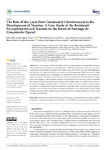The Role of the Local Host Community’s Involvement in the Development of Tourism: A Case Study of the Residents’ Perceptions toward Tourism on the Route of Santiago de Compostela (Spain)

Ver/
Use este enlace para citar
http://hdl.handle.net/2183/29084
A non ser que se indique outra cousa, a licenza do ítem descríbese como Atribución 4.0 Internacional
Coleccións
- Investigación (FEE) [871]
Metadatos
Mostrar o rexistro completo do ítemTítulo
The Role of the Local Host Community’s Involvement in the Development of Tourism: A Case Study of the Residents’ Perceptions toward Tourism on the Route of Santiago de Compostela (Spain)Autor(es)
Data
2021Cita bibliográfica
Soares, J.-R.-R.; Casado-Claro, M.-F.; Lezcano-González, M.-E.; Sánchez-Fernández, M.-D.; Gabriel, L.-P.-M.-C.; Abríl-Sellarés, M. The Role of the Local Host Community’s Involvement in the Development of Tourism: A Case Study of the Residents’ Perceptions toward Tourism on the Route of Santiago de Compostela (Spain). Sustainability 2021, 13, 9576. https://doi.org/10.3390/su13179576
Resumo
[Abstract] As an economic, social, and cultural activity, tourism shapes the relationship between
visitors and local communities in tourist destinations. While tourism generates economic growth and
employment opportunities for residents, its benefits come with a social cost. This article highlights
the results of an online survey that was carried out at the beginning of 2021 in the seven major
Galician cities along the Route of Santiago de Compostela (the Way of St. James) in Spain, which is a
historical, natural, and cultural tourist attraction that is inscribed in the UNESCO’s World Heritage
List in the category of cultural assets. The goal of the research work was to get to know first-hand
the opinion of local communities about the positive and negative effects of tourism in their cities, on
the Route of Santiago, and in the region of Galicia as a whole. Research work shows that residents’
perception of tourism leans toward the positive side, although it also reveals the need for tourism
planners to involve host communities in tourism development. This research study about a World
Heritage site should prove useful for political decision makers, tourism planners, and experts, both
in Galicia and elsewhere.
Palabras chave
Tourism effects
Route of Santiago de Compostela
Local communities
Tourism perceptions
Participatory tourism development
Post-COVID-19
Recovery sustainable tourism
Overtourism
Route of Santiago de Compostela
Local communities
Tourism perceptions
Participatory tourism development
Post-COVID-19
Recovery sustainable tourism
Overtourism
Versión do editor
Dereitos
Atribución 4.0 Internacional
ISSN
2071-1050
Ítems relacionados
Mostrando ítems relacionados por Título, autor ou materia.
-
Análisis de la imagen proyectada y percibida de los destinos turísticos accesibles en la era digital
Leiras, Ana (2024)[Resumen] La representación efectiva de la accesibilidad mejora la imagen y aumenta la cuota de demanda de los destinos, al atraer a un espectro más amplio de población. Esta tesis doctoral cubre un vacío investigativo ... -
Tourism observatories as an intelligent tool for urban cultural tourism management. The case of a Coruña (Galicia, Spain)
Caamaño-Franco, Iria; Muiño-Sar, Begoña; Guillén Solórzano, Eduardo (Asociación de Investigación y Estudios del Sector Turístico (INVESTUR), 2024)[Resumen]: En un entorno cada vez más cambiante y dinámico, parece necesaria que la estructuración y definición de las políticas turísticas sean coherentes con las realidades que emergen. Por ello, es de suma importancia ... -
El turismo sostenible en España: análisis de los planes estratégicos de sostenibilidad de Zaragoza y Barcelona
Fernández Fernández, Javier L. (Universidade da Coruña, 2020)[Resumen] Una característica reciente en el sector turístico es la introducción de criterios de sostenibilidad, dando lugar al denominado turismo sostenible. El objeto de este estudio es el análisis de la sostenibilidad ...






